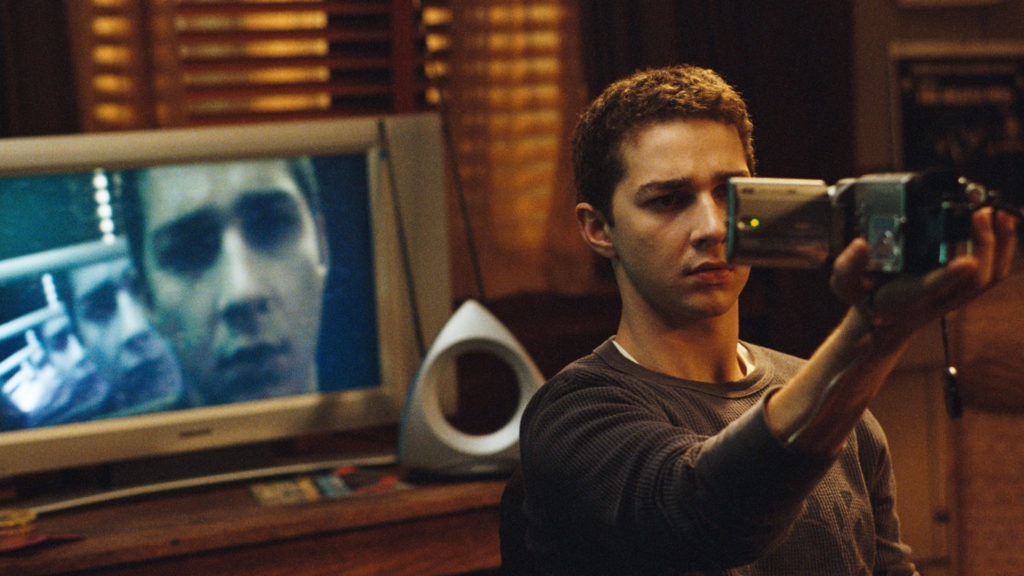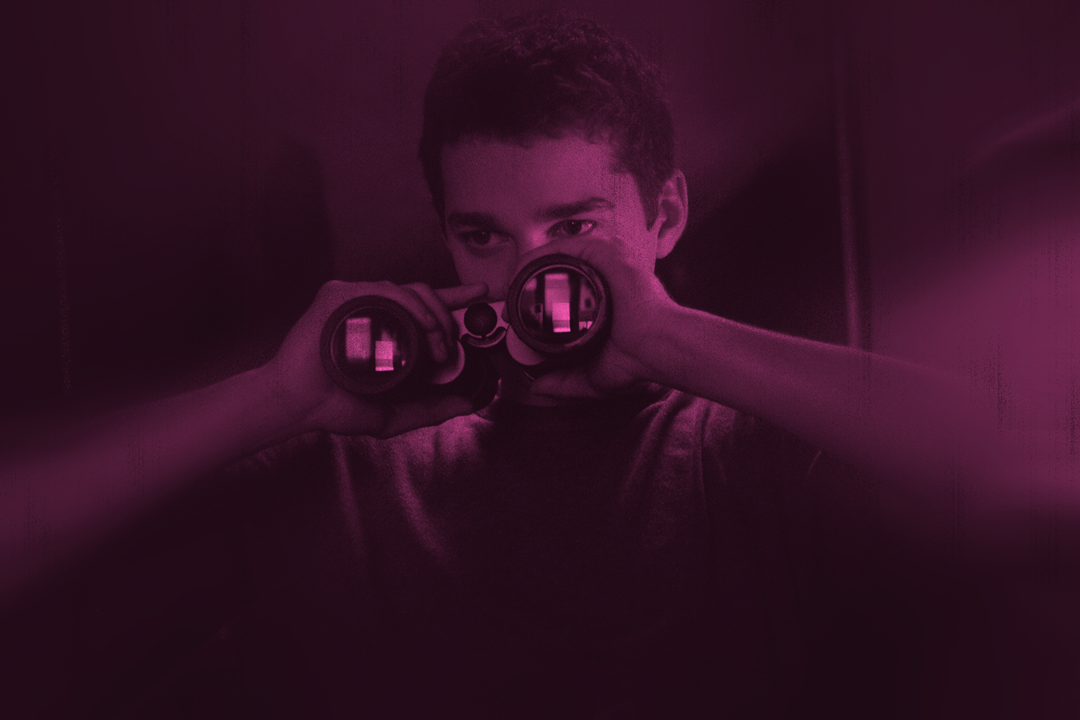Disturbia is one of those “comfort” movies for me that I turn to approximately every two years when summer rolls around. Maybe it’s the sunny, suburban setting, maybe it’s the music, maybe it’s the teen romance, but to me, Disturbia is synonymous with summer. I recently watched it again at the end of last summer and as the credits rolled and I was thinking to myself how much I love this movie, it occurred to me that I’ve been watching it for over a decade and have never gotten sick of it. Some might argue it’s my nostalgia glasses (since I’ve loved this movie ever since it came out when I was seventeen), or my crush on Shia LaBeouf, but I think there’s something to be said for when a movie has the longevity to remain a constant on your to-watch list to the point that it transcends from your child or teenage years into adulthood.
Nostalgia aside, 13 years later in 2020, Disturbia had a full-circle moment for me personally during the COVID-19 pandemic where the parallels between the main character, Kale (played by Shia LaBeouf) being on house arrest, and myself, along with the rest of the world, being stuck in quarantine were unignorable. This of course gave me a new appreciation for the subject matter and the relatability made the film even more enjoyable.
As I was basking in the afterglow of nostalgia after my most recent watch, I came to realize that critics and movie reviewers seemed to view Disturbia as average at best and terrible at worst—scoring 3.1 stars on Letterboxd (with a measly 132 fans, might I add), 6.8/10 on IMDB, a Metascore of 62/100 on Metacritic, and finally a 69% tomatometer score on Rotten Tomatoes. It should be noted, however, that Disturbia did receive a User Score of 8.1 on Metacritic, which is more what I expected.
This movie may not be a deep or complex cinematic masterpiece worthy of critical discussion, but even as negative reviewers on IMDB admitted, it is an undeniably fun watch. Where reviewers are divided is on the film’s ability to create suspense, and I agree with fans that Disturbia absolutely delivers on the suspense, despite critics’ accusations of the movie being predictable, the characters being “stupid”, or the subplot of the romance between the two lead characters detracting from the scare factor.

The Plot
Directed by D.J. Caruso, Disturbia follows a teen, Kale (played by Shia LaBeouf) on house arrest who by virtue of being locked in his house begins spying on his neighbours to cure his boredom. After a series of creepy discoveries, he and his friends begin to suspect that his neighbour, Mr. Turner (played by David Morse) is a serial killer. Obsessed with finding the truth, Kale begins his own investigation all from the confines of his room, and we watch it unfold from his POV as the tension mounts, leading to a thrilling climax.

The Criticism
Is It A Ripoff?
The biggest criticism of Disturbia is that at worst it is a blatant ripoff of Alfred Hitchcock’s Rear Window, and at best it is derivative with no payoff. The merit to this claim might even be evidenced by the fact that due to similarities to Rear Window, DreamWorks was actually sued for copyright infringement, although the lawsuit was eventually dropped. Aside from comparisons to Rear Window, Disturbia has also been likened to The Bedroom Window and Fright Night. The takeaway here is that all movies are derivative at their core, so it is unfair to dismiss a movie based on the fact is shares similarities to another—in art, to quote Jim Jarmusch, “Nothing is original.” That is not to say I approve of blatantly copying something without adding value to it, but you would be hard-pressed to find an entirely original movie concept anywhere. That being said, those that acknowledge the similarities that Disturbia shares to Rear Window view the movie as an homage to the Alfred Hitchcock classic, and would categorize it as a hip, modern-day reimagining of Rear Window for a younger audience. I would agree with that.

Is It Predictible?
Sure, it’s predictable in the sense that you’re 90% certain that his neighbour, Mr. Turner is a killer, but the hook is not an is-he-or-isn’t-he a killer dilemma, but how Kale will prove he is. It reminds me of the 2009 remake of The Stepfather, however unlike Disturbia, in The Stepfather it is clear from the onset that the eponymous stepfather is the killer (right from the opening credits where it shows his butchered family) and what drives the plot is the suspense of whether his new stepson, Michael (played by Penn Badgley) will be able to prove he is the killer before he becomes the victim. Disturbia is even a little more interesting because they actually cast doubt on the certainty of Mr. Turner being a killer by “disproving” some of Kale’s theories (see next point, below).

Are The Characters Stupid?
Spoiler Alert. Many negative reviews said that due to lazy writing, Mr. Turner’s character gradually becomes stupider as the film goes on, most notably when he begins conducting sketchy business in plain sight of his neighbour (for example, the scene where Kale sees Turner through his window handling what looks like a bloody corpse behind the thin veil of a plastic sheet). In my opinion, this is a red herring created by the writers to advance the plot by casting doubt on Turner’s guilt in the viewers’ mind, but moreover, it seems obvious to me that Turner did this intentionally to destroy Kale’s credibility; Wherein when Kale accuses Turner of murder and hiding a body in his garage which upon police investigation, turns out to be roadkill he picked up and brought home, any credibility Kale had with his mother, and the near non-existent credibility he had with the police after his house arrest was destroyed. Turner clearly gutted the deer in almost plain sight of Kale to taunt him and bait him to investigate and inevitably call the police and set up a narrative that Kale is unreliable. Turner makes it crystal clear that he knew he was being watched after he confronted Ashley in the parking lot demanding his privacy, so if you have common sense you can assume that he knew Kale would be watching when he gutted the deer.
This kind of “critical thinking” can be applied to other so-called plotholes that have been pointed out in negative reviews where characters are accused of not behaving in ways that viewers would expect them to—like Kale’s mother’s reactions, for example. Many negative reviewers thought she was an idiot for not believing her son that their neighbour is a killer, but in fact, this “no one believes me” dilemma is actually prevalent in countless horror movies, like the previously mentioned Fright Night and The Stepfather, so it’s actually a very common theme. Plus, it’s clear to me that Kale’s mother was more motivated to keep Kale out of trouble with the law than to get caught up in Kale’s investigation (besides, she probably assumed Kale didn’t want her to date Turner so he was trying to make him look bad). All this being said, I do have to agree with negative reviewers that the character of Kale’s mother was underwritten and lacking emotional depth, especially in how little empathy she shows towards Kale in the aftermath of his father’s death. Because of this lack of compassion towards Kale it seems viewers had trouble accepting that she was both emotionally distant and unsupportive in not believing her son when it comes to the question of a murderer next door.

A Closer Look At Sarah Roemer’s Character
I love that Sarah Roemer’s character, Ashley goes from a basic, one-dimensional love interest when her character is first introduced, to a more developed, central character by the second act. She could have been relegated to the prototypical girlfriend role (like Imogen Poots’ Amy in the 2011 Fright Night remake) where she is underdeveloped and only a passive participant in the action. So I appreciate that her character is portrayed as actually taking an active role in the investigation of Mr. Turner alongside Kale and his best friend, Ronnie and that they both respect her for it and even admire her skills. It’s refreshing that the character of Ashley wasn’t reduced to a love interest who serves to prop up the protagonist, Kale to advance the plot using traditional female horror sidekick clichés (i.e. the girlfriend who doesn’t believe her boyfriend’s neighbour is a killer/vampire/etc, and therefore the same girlfriend who needs protecting from said killer/vampire/etc). Although in the second act she is threatened by Turner and begins to question their motivation to continue the investigation and consequently backs out of it, there is something to be said for how her character was as equally involved as the male characters in the investigation in the first place.
On another note, many of the positive Disturbia reviews praised Sarah Roemer for doing an excellent job creating sexual and romantic tension through her performance of her character, especially within the parameters of the movie’s PG-13 rating and I wholeheartedly agree. Her body language and powerful eye contact were delivered with aplomb, so although the movie was missing the sex and nudity factor that is often a marker of thrillers and horror movies, audiences didn’t miss it because the interactions between Ashley and Kale were still steamy enough to satisfy us, due to the actors’ chemistry and respective performances. Although I’m not going to lie, I was so into their storyline that I wouldn’t have minded if their first kiss scene went on a little longer.

Is It A Cheesy Teen Movie Disguised As A Thriller?
The common criticism that Disturbia is nothing more than a cheesy teen movie disguised as a thriller comes down to your personal tolerance for romance in your scary movies, especially that of the teenage variety. I enjoyed it—blame my crush on Shia LaBeouf—and think it complimented the overall vibe of the movie. In my opinion, their teen romance added to the dreamy, picturesque portrayal of suburbia which was intended to be a juxtaposition to the darker goings-on that hide underneath the glossy suburban facade. Although Kale’s tragic backstory is laid out in the first scene with the death of his father, Ashley’s character development takes place throughout her and Kale’s romantic interactions as we find out about her troubled home life. For this reason, their romantic relationship actually adds to their respective character development and serves to incrementally raise the stakes of the movie. On that note, I have to give the writers and actors credit for creating likable characters and a believable couple whose fate we care about in a thriller or horror movie, unlike other on-screen couples in similarly deadly situations—like the aforementioned 2009 The Stepfather remake, where due to a combination of Amber Heard’s performance and how her character, Kelly was written, made her extremely unlikable.

The Verdict
Disturbia is a fresh, fun, suspenseful romp, akin to other “killer next door” thrillers and horror movies that came before it, and there’s no shame in that. Shia LaBeouf’s performance as Kale makes the movie, of course, but other actors like David Morse, Sarah Roemer, and Aaron Yoo round out the cast perfectly, and I cannot picture any other actors in their respective roles. While on the subject of the supporting cast, I want to give a shoutout to Aaron Yoo’s hilarious performance as Kale’s best friend, Ronnie Chu. To this day I still laugh at the Spanish class scene where Ronnie repeatedly uses the Spanish word for ‘perhaps’, (quizás) in his presentation because it sounds like ‘kiss ass’, much to the amusement of his classmates.
I would also be remiss if I didn’t mention this movie’s stellar soundtrack in this defense. It is a fun and eclectic compilation of songs that perfectly compliment the sunny, suburban setting and the hip tone of the film.
In conclusion, looking back on the less than enthusiastic reviews for 2007’s Distubia, perhaps it got an unfair shake when you actually stop to examine its criticisms more closely. Now over 10 years later, it may be due for a rewatch (or perhaps, a first-time watch). Quizás… it deserves a second chance (I had to say it).


